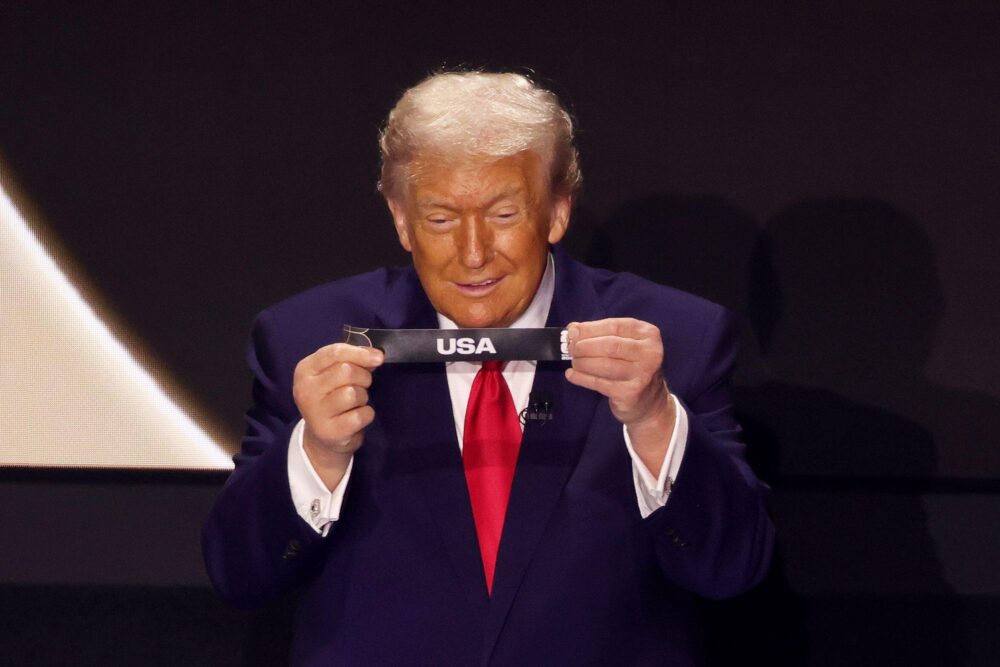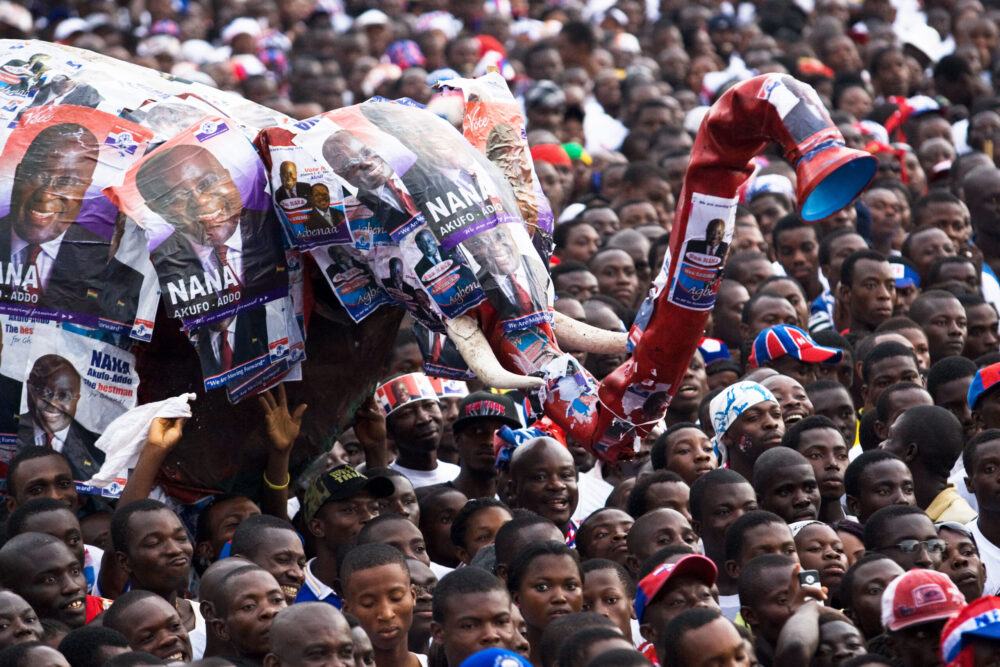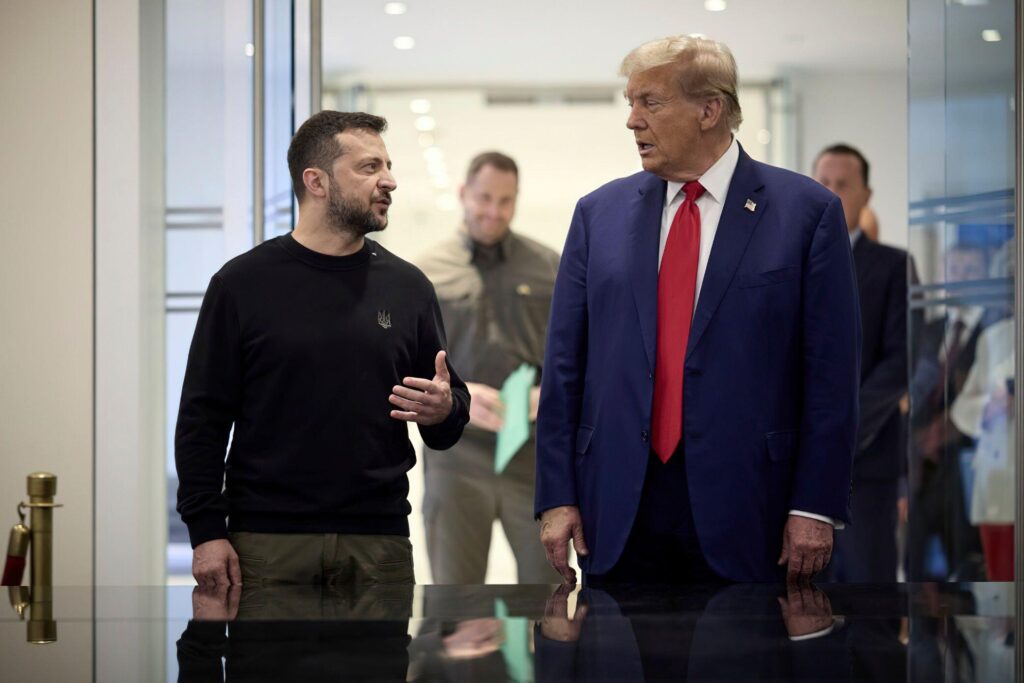
President Trump’s talks with Presidents Zelensky and Putin, together with US special envoy Keith Kellogg’s imminent arrival in Kyiv, have raised expectations that a settlement to the conflict may at last be on the horizon. As my latest polling shows, Ukrainians will be treating this prospect with as much trepidation as hope.
We asked people in Ukraine, Russia, Britain and the US whether they thought the election of President Trump would mean a longer or shorter war, and a better outcome for one side or the other.
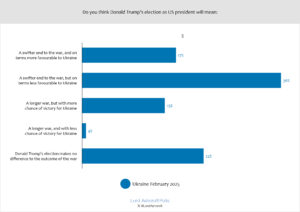
A majority of Ukrainians (53%) thought it would mean a swifter end to the war, but most of these thought this would be on terms less favourable to Ukraine. Overall, only just under 1 in 3 Ukrainians (32%) thought Trump’s election would prove to be to Ukraine’s advantage. Russians were the most likely to believe that Trump’s election would make no difference to the outcome of the war (34%). The remainder were more likely to think it would mean a swifter end to the SMO than a longer one, and a more rather than less favourable outcome for Russia.
Americans were the most likely to think Trump’s election would have some impact on the outcome (only 20% said it would make no difference), but there were considerable variations by voter group. Six in 10 Trump voters thought the new president would mean a swifter end to the war. They were also the only group to think his election would mean a better outcome for Ukraine than for Russia.
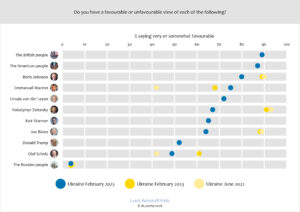
We asked Ukrainians whether they had a positive or negative view of various people. Two thirds said they had a positive view of President Zelensky, though this is down from his favourability ratings of over 90% in the year after the Russian invasion. In terms of individuals, former UK prime minister Boris Johnson tops the table, followed by Zelensky, current UK PM Keir Starmer and former US President Joe Biden – who with a 64% favourability rating is more popular in Ukraine than his successor (52%). French president Emmanuel Macron is alone in having risen in popularity since our 2023 survey. The British people (89%) and the American people (87%) outstrip the politicians.
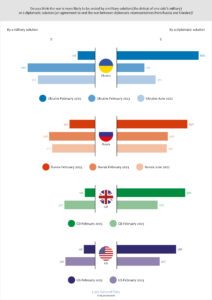
Across the board, I found dramatic shift towards believing that the conflict will end in a diplomatic solution rather than a military victory for one side or the other. While those in Russia, Britain and the US were always more likely to think there would be a diplomatic conclusion, clear majorities in all four countries now believe this. The shift is most marked in Ukraine itself: in my last survey two years ago, 66% believed there would be a military solution; 80% now say the conflict will end with a diplomatic settlement. In the US, 72% of Trump voters foresee a diplomatic end to the war.
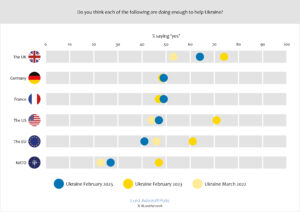
Asked whether they think various countries and organisations are doing enough to help their cause, Ukrainians put the United Kingdom at the top of the table. However, the proportion giving a positive answer for the UK is down by 10 points since 2023 – though this fall is less than for the US (down 24 points), the EU and NATO (both down 20 points). The US and EU are now seen on a par with Germany and France – whose ratings are unchanged since the last survey, but which were previously at the bottom of this table. Only just over a quarter say NATO is doing enough.
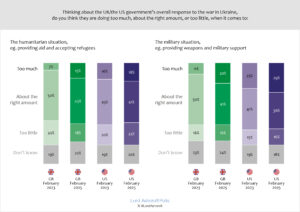
For their part, we asked voters in Britain and the US whether they thought their countries were doing too little or too much to help Ukraine. As in 2023, pluralities in both Britain and the US said they thought their government’s response to the Ukraine conflict had been about right in terms of both humanitarian and military support. However, the proportions saying they are doing too much have doubled on both fronts in the UK, and have also edged up in the US – where 31% of Trump voters say America is doing too much on the humanitarian level and nearly half of Trump voters (47%) say they are providing too much military support.
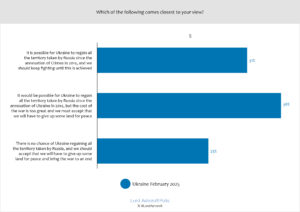
Only just over 3 in 10 Ukrainians agreed it was possible to regain all the territory taken by Russia since the annexation of Crimea in 2014 and that they should keep fighting until that was achieved. More than 6 in 10 said Ukraine would have to accept giving up some land for peace – either because there is no chance of regaining all the territory taken by Russia(23%), or – more often – that while this would be possible, the cost of the war is too great (38%). Those aged 18 to 24 were the most likely to say the country must accept trading land for peace (72%), with more than half (52%) believing it was possible to regain all lost territory but that the cost was too high.
Large majorities in both Ukraine and Russia said they would like to see peace negotiations beginning. In Ukraine, more than three quarters (77%) said they would start negotiations with Russia than continue fighting until the Russian military are defeated (the preference of just 17%). In Russia, 6 in 10 said they would rather start negotiations, with a further 29% saying they would like to do so while continuing the SMO. Only 7% said they wanted to continue the military operation with no peace negotiations.
We asked Ukrainians whether they thought various hypothetical peace scenarios acceptable as conditions for ending the war. These are presented in more detail in the full report. It was clear that while many would countenance a ceasefire on the current front line, there is strong resistance to any deal that involves officially recognising any Ukrainian territory as part of Russia.
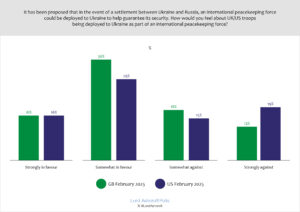
In the UK, just over half (52%) said they would support British troops taking part in an international peacekeeping force to help guarantee Ukraine’s security in the event of a settlement. More than 6 in 10 Conservative and Labour voters were in favour, compared to just 36% of those who voted for Reform UK. In the US, only a minority (45%) said they would favour American troops’ participation in such a force. This included 60% of those who voted for Harris but only 39% of those who voted for Trump.
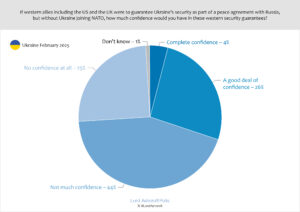
With a huge majority of Ukrainians believing that the threat from Russia is not just down to Putin but will continue after he has gone, only 1 in 25 Ukrainians said they would have complete confidence in security guarantees offered by western allies as part of a peace agreement. A further quarter (26%) said they would have a good deal of confidence. Nearly 7 in 10 said they would have not much confidence (44%) or no confidence at all (25%).

